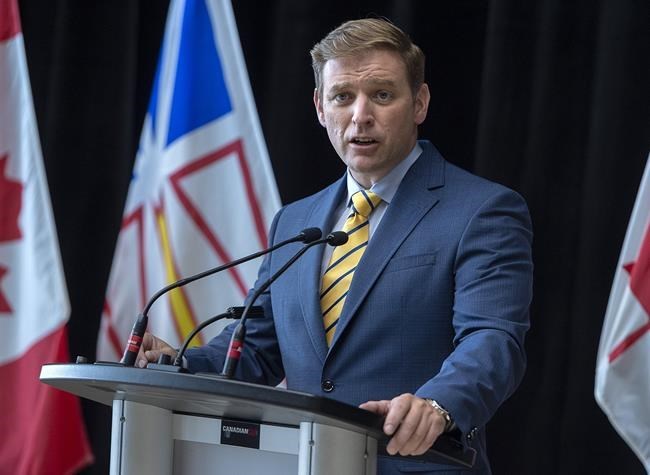ST. JOHN'S, N.L. — The Newfoundland and Labrador government is opening an office in Poland to help Ukrainians fleeing Russian attacks relocate to Canada's easternmost province.
Premier Andrew Furey unveiled the plans today in St. John's, saying the office in Warsaw will work with the Canadian Embassy to help Ukrainian refugees navigate the process of moving to the province. He said the office will be staffed by employees from the provincial Office of Immigration and Multiculturalism who speak the languages in the region.
"The point of first contact is an incredibly important one with respect to refugees and where they end up settling," Furey told reporters at the provincial legislature. "We want to make sure that people who have been displaced from their own homes in Ukraine know that Newfoundland and Labrador is a viable, sustainable option for them to come with their families."
The Warsaw office will be an extension of the province's Ukrainian Family Support Desk that was launched on March 2 to help residents bring loved ones in Ukraine to the province, Furey said. The province says the office will hold information sessions about immigration programs and support services offered by the province and help connect Ukrainians with employers in Newfoundland and Labrador.
Russia began its ongoing invasion of Ukraine on Feb. 24, striking several cities in the country, including the capital of Kyiv. As of March 15, the United Nations said three million people had fled the country, with the majority seeking refuge in neighbouring Poland.
The federal government announced Thursday it had begun accepting applications from Ukrainians and their families fleeing Russian aggression who want to come to Canada. Ottawa has said Canada will accept an unlimited number of Ukrainian refugees, and officials said Thursday they'd be able to stay in the country for up to three years while they decide their next steps. Federal Immigration Minister Sean Fraser said two weeks ago Ukrainian refugee applications would not be subject to conditions such as language requirements or labour market impact assessments.
It's a different approach than that taken with refugees from Syria or Afghanistan, in which Ottawa selects those who will be allowed to come to the country and then provides assistance with transport and resettlement, Newfoundland and Labrador Immigration Minister Gerry Byrne said Thursday.
Ukrainian refugees won't have that logistical help from Ottawa, Byrne said, so Newfoundland and Labrador is stepping up. He said the province's support desk has been flooded with offers to help from residents since it was opened.
"This is about a unique response to unique situation," Byrne told reporters. "Ukrainians need to know we're on their side ... We're letting them know that we are going to support them through the visa application process."
He said a team is already on the ground in Warsaw to gather information and figure out how the province can best serve Ukrainian refugees.
Newfoundland and Labrador has a population of roughly 521,500 people and approximately 1,400 of those identify as being of Ukrainian descent, Byrne said.
The province also has the country’s most rapidly aging population, coupled with a low birthrate and a high rate of out-migration, according to Statistics Canada. The province's budget last year set a goal of welcoming 5,100 newcomers each year by 2026.
Byrne said it is too early to say how many Ukrainians will move to the province, noting that many European countries had opened their doors to them as well. "Ukrainians will make the choice," he said.
As of March 3, over 6,100 Ukrainians had arrived in Canada since Jan. 1, according to a federal government news release.
This report by The Canadian Press was first published March 17, 2022.
— With files from Laura Osman in Ottawa
Sarah Smellie, The Canadian Press




